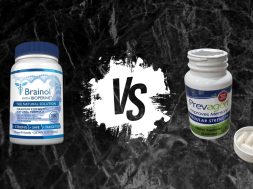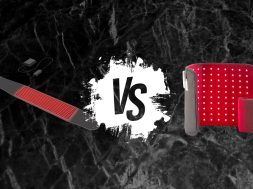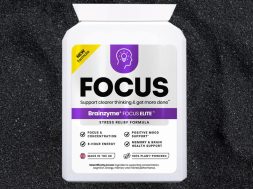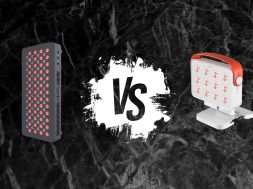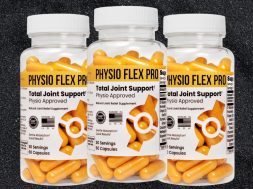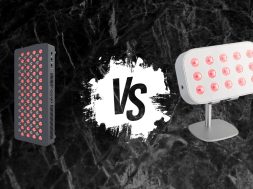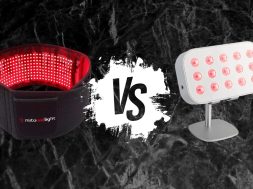
Alpha Brain is the most well-known nootropic supplement because Joe Rogan promotes it heavily. But NooCube is not far behind, even without celebrity backing.
So I took NooCube and Alpha Brain (not simultaneously) to see which is worth the hype.
Quick Verdict
Noocube easily wins over Alpha Brain in this comparison. The two products have similar ingredients and formulations, but Noocube is much better dosed. Both are non-stimulant nootropics aiming for long-term effects, but Noocube delivers them.
My experience with the two products confirmed my expectations. While on Noocube, I began working better and more focused. At the same time, Alpha Brain did not deliver effects substantial enough to mention.
| Feature | Winner |
|---|---|
| Ingredients | Draw |
| Dosage | NooCube |
| Short-Term Effects | Draw |
| Long Term Effects | NooCube |
| Third-Party Testing | Alpha Brain |
| Clinical Research | NooCube |
| Side Effects | NooCube |
| User Reviews | Alpha Brain |
| Price | Draw |
Winner
Based on my experience with each nootropic supplement, neither Alpha Brain nor NooCube hold a light to Mind Lab Pro.
Mind Lab Pro has 3 clinical studies backing it’s formula and is a non-stimulant nootropric to enhance short and long term brain function.
What Is Noocube?
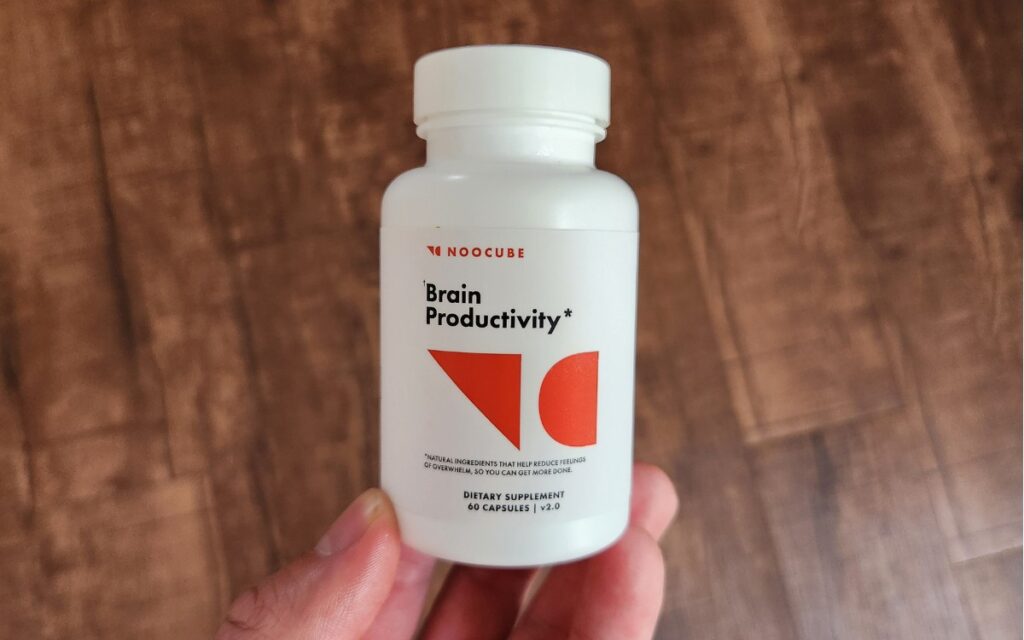
NooCube is a comprehensive daily nootropic supplement that boosts memory, focus, and problem-solving abilities and reduces brain fog.
The all-natural combination of more than a dozen chemicals has the ability to support complete long-term cognitive growth suitable for working professionals, students, and athletes.
Most of the effects occur gradually over time with daily use of the substance, while others, such as enhanced mood and lower anxiety, can be noted considerably sooner.
I go into more detail in my NooCube review.
What Is Alpha Brain?

Alpha Brain is a nootropic created by Onnit Labs, a popular company that makes various health supplements, fitness supplements, and sports equipment.
It is perhaps the most popular nootropics supplement on the market, thanks to the endorsement by popular podcaster and Onnit co-owner Joe Rogan endorsement.
This product is advertised as a cutting-edge brain supplement to get you in the flow. It is one of the first nootropic supplements to undergo double-blind, placebo-controlled trials.
I go into more detail in my Alpha Brain review, including Alpha Brain Black.
Noocube vs. Alpha Brain Main Differences

Benefits
With many shared ingredients, the promised benefits of both products largely overlap, even though the results are not the same in my experience.
The benefits include having better focus, increased attention span, reduced stress and anxiety, and better memory. Noocube also claims to protect the eyes from screen-related fatigue.
Overall, both nootropics intend to make you more productive, focused, and effective, regardless of whether you need to be so in your personal or professional life.
Ingredients
The big problem with the ingredients list on Alpha Brain is the exact dosages of each ingredient are undisclosed. Instead, they are separated into three blends called Onnit Flow Bled, Focus Blend, and Fuel Blend.
Noocube, on the other hand, takes the proper approach and shares the exact dose for each ingredient.
I will start the comparison with the three main ingredients found in both products. They are a staple of most nootropics, and it’s no surprise to find them in the formulations.
On top of them, a few other substances overlap between the two.
Also worth noting is that Noocube has updated its formula to the 3.0 version, which removed some allergens for better alternative sources of the same core components.
This way, it’s accessible to more people.
L-theanine, an amino acid found in green tea, is a potent antioxidant incorporated in practically all nootropics due to its good effect on stress relief [1] and improved verbal fluency and executive function [2]. The suggested dose is 200 mg. Noocube has 100 mg, while Alpha Brain likely contains around 150 mg.
The second cornerstone nootropic component shared between the two products is L-tyrosine, which is proven to improve mind flexibility and multitasking [3].
Noocube contains 250 mg of L-Tyrosine, and I estimate roughly the same is in Alpha Brain.
The third shared and very potent component is the ayurvedic herb Bacopa monnieri. It has been proven to improve verbal learning, memory acquisition, and delayed recall by helping brain receptors process information [4].
The next shared ingredient is Huperzine A. The substance is linked with potentially assisting recovery from brain injuries and enhancing brain function in Alzheimer’s disease patients [8,9].
The last common ingredient is Cat’s claw, commonly included in nootropic formulas because of the time-honored traditions in cultures that use it to promote cognitive function. However, no current studies support the benefits.
Lutemax 2020 is a speculative substance included in Noocube. It is simply a combination of three carotenoids said to boost attention and verbal memory while also promoting eye health.
Noocube markets the substance as a key element in reducing eye fatigue from screens and an important part of the formulation.
Keep in mind there are currently no conclusive studies to back up these claims.
Panax ginseng is a much more studied component in Noocube and has been used to relieve stress since ancient times. Modern studies reveal various cognitive benefits, including working memory performance and quicker recall. [5,6,7].
Another ingredient included in the latest version of the formula is Choline Bitartrate. Recent studies demonstrate memory improvements in the elderly and people with neurodegenerative conditions but not in healthy individuals [10].
Other speculative compounds with potential but no clear results in Noocube include Resveratrol and Pterostilbene Cat’s Claw, the latter of which may help alleviate brain fog.
Ingredients in Alpha Brain deserving attention are Alpha GPC and Pterostilbene. Alpha GPC shows promise in enhancing cognitive function and even outperforms caffeine in some tasks [11].
Pterostilbene may combat cognitive decline in relation to aging [12].
Stimulant vs. Non-Stimulant

Noocube and Mind Lab Pro are both non-stimulant nootropics, meaning they do not contain caffeine or other ingredients immediately boosting energy and attention.
This could be a disadvantage for someone like me who likes products that work instantly. Nonetheless, it is a huge advantage for many people who do not want caffeine to disrupt their sleep or whose bodies do not react well to stimulants.
Short vs. Long-Term Effects
The full effects of these non-stimulant products will only be evident with consistent use. Nootropics aim to deliver sustained benefits for productivity over time, even though there is potential for immediate enhancements in focus and stress relief.
Manufacturers often recommend a 3 to 4-month intake to fully benefit from the product. This is why the 90 to 120-serving bundles are priced lower, in addition to encouraging customers to purchase more even if they haven’t seen any effects.
Clinical Research
Noocube contains many clinically researched ingredients, and I have shared some relevant ones in this review’s ingredients section.
Others lack sufficient scientific proof, but are herbs and plants that have been used in traditional medicine for ages, which is enough for many people to believe they are effective.
Alpha Brain was the first nootropic to publish peer-reviewed studies about its product. They discovered using Alpha Brain for 6 weeks significantly enhanced delayed verbal recall and executive functioning compared to a placebo-controlled group [13].
There is a red flag with this study, though, as it was funded by Onnit, which naturally assumes bias.
Side Effects
The most common adverse effects of nootropics with natural ingredients include stomach troubles such as nausea or bloating, as well as headaches.
Usually, only a small percentage of the population feels the adverse effects, and I am not one of them and haven’t had any side effects from either product.
However, I’ve encountered more than a few reviews from people experiencing nausea or headaches when taking Alpha Brain. I assume these are usually people with pre-existing stomach problems.
I haven’t found people complaining about Noocube, but then there are too few reviews, so even if some are experiencing adverse effects, there is no way to know about it.
User Reviews
Alpha Brain takes the bold and correct approach of displaying all user reviews on their website.
Being a hugely popular product thanks to it being endorsed (and owned) by Joe Rogan, there are nearly 7000 reviews on the website, and naturally, not all of them are good.
The overall score is 3.5/5 stars. Many people do not feel the effects and had an experience similar to mine.
But there are also a lot of favorable reviews from happy customers, which once again confirms the fact that different people react differently to supplements.
Noocube only displays a selection of favorable reviews on their website. While I acknowledge the product’s quality, having complete access to people’s thoughts is a more reliable measure of a manufacturer’s confidence, and I am not a fan of this approach.
Lawsuits
NooCube has no lawsuit against them at the time of writing this. However, Onnit Labs (manufacturer of Alpha Brain) is currently in a lawsuit due to alleged false claims from their peer-reviewed study.
Plaintiff Jean Paul Lotz’s class action lawsuit claims its Alpha BRAIN® brain health supplements perform no better than a placebo. This is an on-going investigation.
Lotz, et al. v. Onnit Labs, Inc., Case No. 7:24-cv-03098, in the U.S. District Court for the Southern District of New York.
Price
| Nootropic | 1 Bottle | 1 / 3 Bottles | 1 / 5 Bottles |
|---|---|---|---|
| NooCube | $64.99 / 30 servings ($1.95/ serving) | $129.99 / 90 servings ($1.44/serving) | $194.99 / 150 servings ($1.30/serving) |
| Alpha Brain | $34.95 / 15 servings ($2.33/serving) | $79.95 / 45 servings ($1.78/serving) | $67.96 / 45 servings ($1.44/serving w/ subscription) |
My Experience With Noocube And Alpha Brain

My experience with Noocube has been great, but I can’t say the same for Alpha Brain.
As expected from non-stimulant nootropics, the results from Noocube were not immediately noticeable.
But during the second week of my 4-week test, I noticed I could focus better and for longer when writing an article, and my urge to open the web and start checking unrelated stuff was lower.
After another week, I felt more energized and rarely experienced an afternoon slump. My memory also appeared to have improved slightly.
Regarding the advertised reduction in eye fatigue, I did not experience any improvement.
Unfortunately, Alpha Brain did not deliver the promised effects. Even though the most potent ingredients are the same as in Noocube, the lower dosages may require longer use to feel the effects.
Or it may be that I don’t react well to this specific formulation. Either way, I am not happy with my experience taking Alpha Brain.
Should You Choose Noocube Or Alpha Brain?
It’s easy for me to recommend Noocube in general, and even easier to pick it over Alpha Brain. My experience with the products positively affected concentration and mental energy from Noocube, and nothing was noticeable when I took Alpha Brain.
The two products have many similar ingredients, and Alpha Brain’s formulation is not bad. However, the dosages are hidden behind blends, and the totals simply cannot contain efficacious dosages of many of the ingredients.
Considering the two supplements’ relatively equal prices and their non-stimulant approaches, I believe Noocube is a much better choice.
Winner
Second Option
NooCube Brain Productivity
A non-stimulant nootropic with a comprehensive formulation for smooth energy and long-term brain health.
CHECK CURRENT DEALSReferences
- Hidese, S., Ogawa, S., Ota, M., Ishida, I., Yasukawa, Z., Ozeki, M., & Kunugi, H. (2019). Effects of L-theanine administration on stress-related symptoms and cognitive functions in healthy adults: a randomized controlled trial. Nutrients, 11(10), 2362.
- Williams, J. L., Everett, J. M., D’Cunha, N. M., Sergi, D., Georgousopoulou, E. N., Keegan, R. J., … & Naumovski, N. (2020). The effects of green tea amino acid L-theanine consumption on the ability to manage stress and anxiety levels: A systematic review. Plant foods for human nutrition, 75, 12-23.
- Steenbergen, L., Sellaro, R., Hommel, B., & Colzato, L. S. (2015). Tyrosine promotes cognitive flexibility: evidence from proactive vs. reactive control during task switching performance. Neuropsychologia, 69, 50-55.
- Morgan, A., & Stevens, J. (2010). Does Bacopa monnieri improve memory performance in older persons? Results of a randomized, placebo-controlled, double-blind trial. The journal of alternative and complementary medicine, 16(7), 753-759.
- Park, K. C., Jin, H., Zheng, R., Kim, S., Lee, S. E., Kim, B. H., & Yim, S. V. (2019). Cognition enhancing effect of panax ginseng in Korean volunteers with mild cognitive impairment: a randomized, double-blind, placebo-controlled clinical trial. Translational and Clinical Pharmacology, 27(3), 92-97.
- Kennedy, D. O., Reay, J. L., & Scholey, A. B. (2007). Effects of 8 weeks administration of Korean Panax ginseng extract on the mood and cognitive performance of healthy individuals. Journal of Ginseng Research, 31(1), 34.
- Kennedy, D. O., & Scholey, A. B. (2003). Ginseng: potential for the enhancement of cognitive performance and mood. Pharmacology Biochemistry and Behavior, 75(3), 687-700.
- Li, J., Wu, H. M., Zhou, R. L., Liu, G. J., & Dong, B. R. (2008). Huperzine A for Alzheimer’s disease. Cochrane Database of Systematic Reviews, (2).
- Mei, Z., Zheng, P., Tan, X., Wang, Y., & Situ, B. (2017). Huperzine A alleviates neuroinflammation, oxidative stress and improves cognitive function after repetitive traumatic brain injury. Metabolic Brain Disease, 32, 1861-1869.
- Lippelt DP, van der Kint S, van Herk K, Naber M (2016) No Acute Effects of Choline Bitartrate Food Supplements on Memory in Healthy, Young, Human Adults. PLoS ONE 11(6): e0157714. https://doi.org/10.1371/journal.pone.0157714
- Parker, A. G., Byars, A., Purpura, M., & Jäger, R. (2015). The effects of alpha-glycerylphosphorylcholine, caffeine or placebo on markers of mood, cognitive function, power, speed, and agility. Journal of the International Society of Sports Nutrition, 12(sup1), P41.
- Dutta, B. J., Rakshe, P. S., Maurya, N., Chib, S., & Singh, S. (2023). Unlocking the therapeutic potential of natural stilbene: Exploring pterostilbene as a powerful ally against aging and cognitive decline. Ageing Research Reviews, 92, 102125.
- Solomon, T. M., Leech, J., deBros, G. B., Murphy, C. A., Budson, A. E., Vassey, E. A., & Solomon, P. R. (2016). A randomized, double?blind, placebo controlled, parallel group, efficacy study of alpha BRAIN® administered orally. Human Psychopharmacology: Clinical and Experimental, 31(2), 135-143.
Affiliate Disclosure: The links provided may earn us a small commission at no additional cost to you if you choose to purchase the recommended product. This support allows our research and editorial team to continue providing high-quality recommendations.

